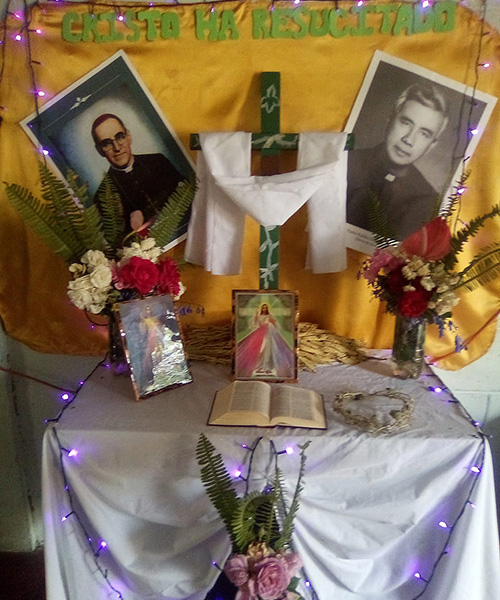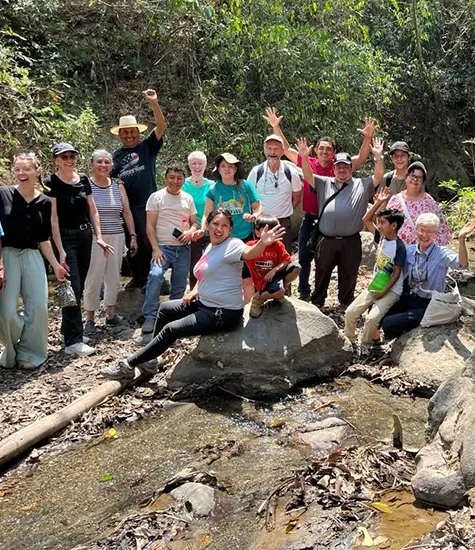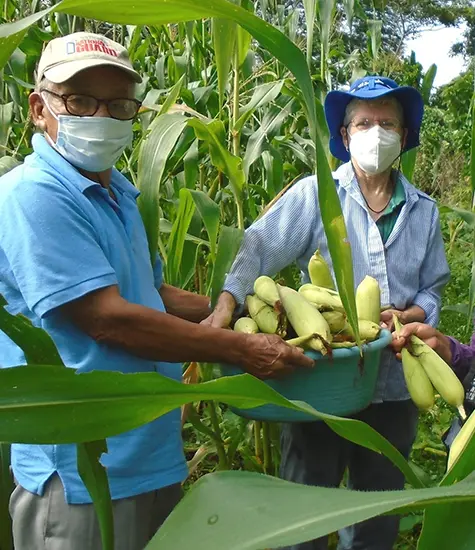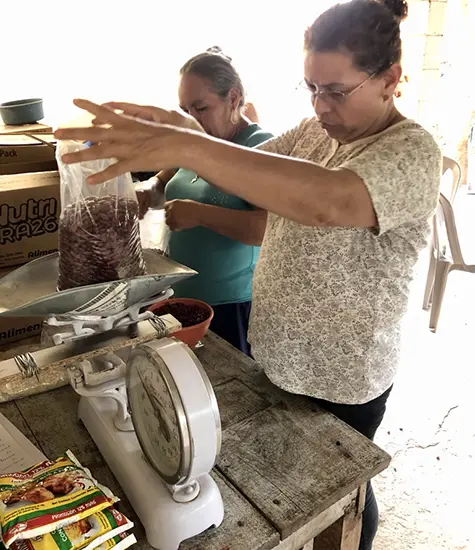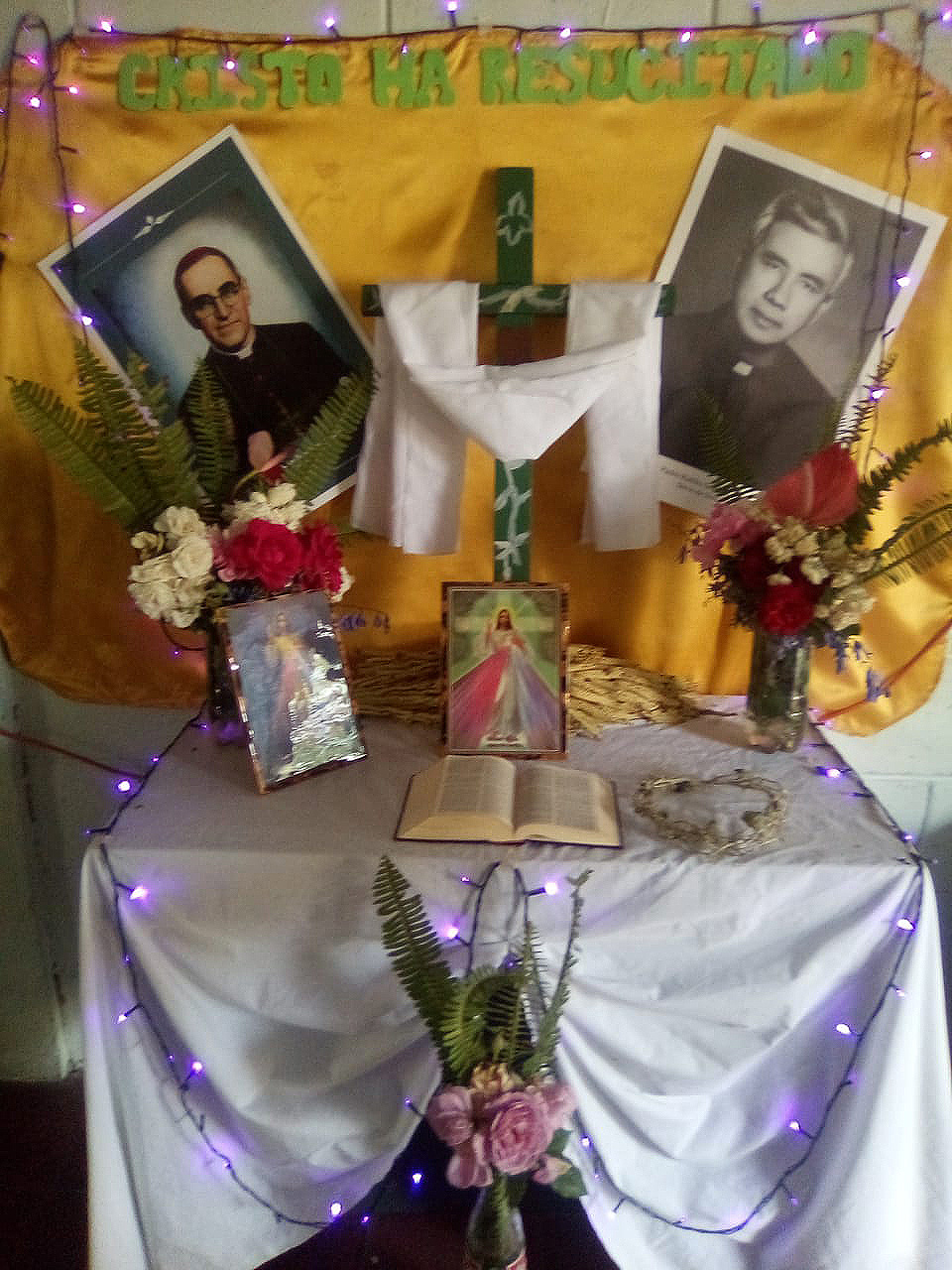
Easter Sunday home altar from a parishioner of St. John the Baptist Parish in Cojutepeque, El Salvador
I’ve heard people say that what was normal before the virus will never again be normal after it. I hope that will be the case here in El Salvador, at least on account of justice in health care, the environment, education, and so many other social emergencies.
A few days ago I went to visit Father Luis at our parish. He was wearing a white T-shirt and looked worried. We sat down at the kitchen, and he served me a glass of orange juice and poured himself a cup of coffee. He told me that he had just received a message from a friend who had entered his national ID number into the government’s computerized subsidy system. It’s a step in the process for Salvadorans to claim the $300 that the government is distributing to 1.5 million families to help them to buy food during our quarantine. The computer shot back: “Order for Capture.”
For Father Luis and his friend, who lived through periods of emergency powers during the country’s civil war (1980-1992), this was a frightening experience. The government of El Salvador’s President Nayib Bukele imposed a state of emergency on March 14, arguing that it needed extraordinary tools to fight COVID-19.
A week later, the president imposed a quarantine for 30 days, which has since been extended until May 1. As necessary as a quarantine is, the draconian way in which it is being enforced has given cause for concern. More than 2,000 people who are not sick with the virus but who were simply on the streets “without good reason” have been forcibly placed in government quarantine compounds for 30 days for violating the stay-at-home order.
Stories of police and military abuse are surfacing almost daily now. Police demanded that one 19-year-old pay them $50, or he’d be taken into quarantine. When he refused, the police shot him in the legs.
Just the other day, Aldo from our community of La Esperanza, who sells bread on the streets—bread vendors are allowed to sell during the quarantine—was stopped by police because his plastic glove had a hole in it. He was frightened and feared being hauled off to quarantine detention; he was still shaking from the encounter when he arrived at my house (I buy bread from him most everyday).
He talked and talked and told me that what is happening is beyond the pandemic. He also lived through the civil war. and the “hole in the glove” incident opened up past nightmares and traumas.
On April 15, for the third time, the Supreme Court ordered the government to stop forced quarantine detentions because they are unconstitutional. But the government refuses to comply, and many now fear for El Salvador’s fragile, nascent democracy.
“People are tense,” Father Luis said and took a sip of coffee. I mentioned how much it helps to follow Mass on Facebook, and how much I had appreciated the altar project that he and the small Christian base communities had organized—families made altars for each day of Holy Week (in their homes) and circulated pictures of them.
“Solidarity is not in quarantine,” Father Luis quoted Pope Francis, adding that the offerings people gave from the altar project, which go to buy food and medicine for the poor, was stronger than ever this year. “Those altars are the generosity of suffering humanity,” he said.
One of the most beautiful altars was of an empty, rustic cross with a white shroud draped over it; on one side of the cross was a photograph of St. Óscar Romero and on the other side a photograph of martyred Jesuit Rutilio Grande (see top photo). Written above the altar was “Cristo ha resucitado” (Christ is risen). It was constructed by a family that also earns their livelihood making bread. I talked to them after Holy Week and thanked them for their altar. “Gracias,” the mother said and told me how much they missed taking communion together.
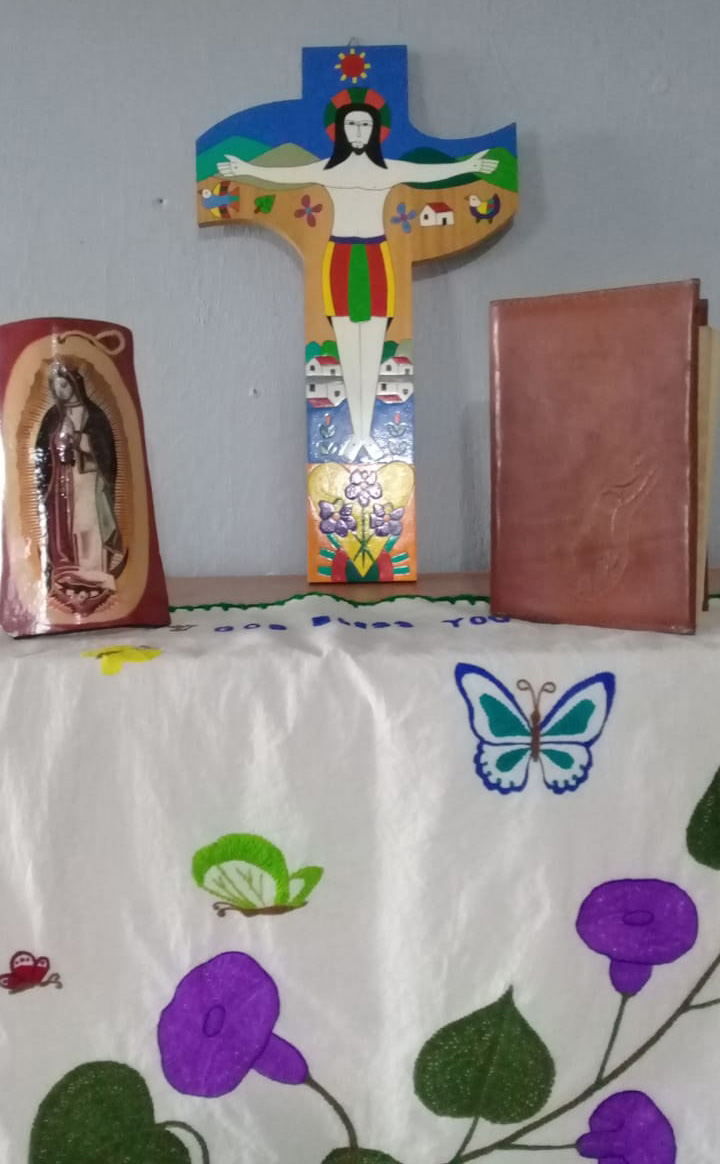
Good Friday’s home altar
I also complimented Father Luis on his creativity at the Easter Vigil Mass. Our parish held Easter Masses—and continues to do so—in a church empty of parishioners because of our quarantine, yet our Masses are live-streamed on social media. Father Luis asked people to take holy water they have in their homes and bless their children and family, as he was doing with the small group of lectors in the church.
“What a beautiful moment,” I said and added how nice it would be to do the same with the Eucharist. Father Luis’s face went bright and a big “sí” jumped across the table.
“Families, with bread from their own homes, feeding one another the Body of Christ—this virus doesn’t have to leave us in eucharistic famine because of the lockdown,” I imagined.
Father Luis then invited me to afternoon Mass, and I gladly accepted. A few of our computer-savvy youth were in the large church with us to handle the live-streaming of the celebration. It was a joy to listen to the Word of God and take communion, but it was also sad knowing that so much unsatiated eucharistic hunger exists in the parish.
Yet this situation has increased our awareness and solidarity with our brothers and sisters in the Amazon, whose eucharistic hunger was highlighted during last year’s Synod for the Amazon.
The words of Maryknoll Father Joe Healey—who is based in Nairobi, Kenya, and has written extensively on eucharistic famine—came back to me. He says that the Catholic Church should study and implement the recommendations of the Amazon Synod on married priests and women deacons. It should include giving lay people in our small Christian base communities more administrative responsibilities in our parishes and outstations, including more involvement in the sacraments.
Yes, the empty church that afternoon was lonely, and the liturgy, as spiritually enriching as it was, didn’t fill that emptiness. But the Body of Christ transformed it into a space where dreams and hopes continue to grow.

